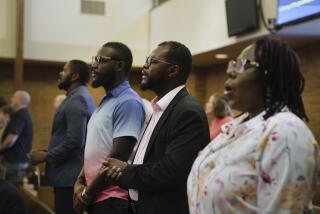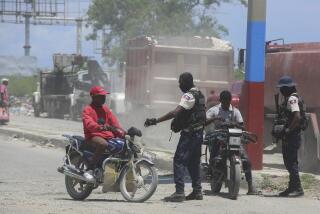Protecting Haiti’s children
The 10 American Baptist missionaries arrested on charges of abducting children from earthquake-ravaged Haiti had circulated fliers promising to give orphans “with no one to love or care for them” a better life in the Dominican Republic, and claiming to have government permission to do so. In fact, they didn’t have the proper paperwork, authorities said, and the New Life Children’s Refuge had yet to build its advertised orphanage. Many of the 33 supposed orphans turned out to have parents. And the group’s leader faces multiple legal claims against her and her Internet shopping business back in Idaho, where the nonprofit is registered to the address of a home she lost to foreclosure in December.
Sound sinister? Yes, it does. Was it? The missionaries’ supporters say no. Perhaps these men and women were motivated by the best of intentions. Perhaps the leader, Laura Silsby, has been unlucky in business during a bad economy, and perhaps that has no bearing on her Christian work. All we know for sure is that, at the very least, it was arrogant and irresponsible for the missionaries to think they could shepherd these 2- to 12-year-olds out of the country without respect for the law or the most basic attention to detail.
Even in impoverished and frequently dysfunctional Haiti, there are laws protecting the rights of children and procedures for adoption. The fact that these are frequently violated, or that the earthquake created a crisis, is no excuse for do-gooders to think they are above the law. On the contrary. Children often suffer most in a crisis. Hundreds of thousands have been left homeless by the earthquake, and many were truly orphaned. And even before this, poverty had ushered many children into indentured servitude, while others were sent abroad through illegal adoptions.
Poverty forces parents to make unbearable choices: which child to feed or educate, which child’s illness to treat. Many of these 33 children reportedly were given up voluntarily by their parents, who believed their offspring were being given a chance to escape the hunger and devastation, and to go to school. Now the children are housed at an Austrian-run orphanage outside Port-au-Prince, and the 10 Americans are in jail.
Some Americans may wonder why Haiti has chosen to prosecute this case when confronted with so many problems. Is anti-Americanism a factor, or a desire to counter the humiliation of being so dependent on U.S. and foreign aid? Although those feelings may exist and the kidnapping charge may be harsh, we understand the Haitian argument that failure to prosecute would send the wrong message to those who prey on innocents. The U.S. government must work with the Haitians to ensure that the Americans receive competent defense lawyers and a fair trial -- which admittedly is not always easy in Haiti -- and if they are convicted, the punishment should fit the crime. But no one should try to impede justice in a country that has struggled to provide it even in the best of times.
More to Read
Sign up for Essential California
The most important California stories and recommendations in your inbox every morning.
You may occasionally receive promotional content from the Los Angeles Times.









